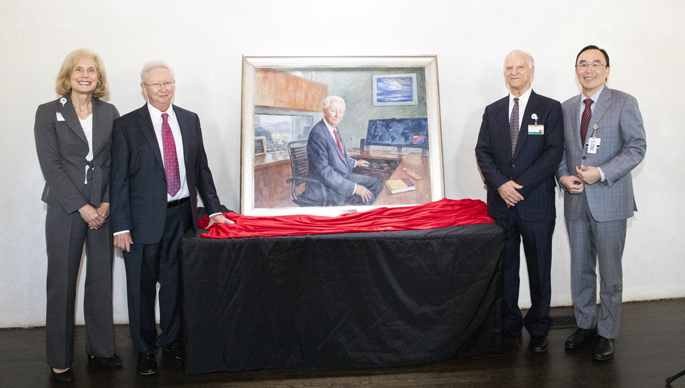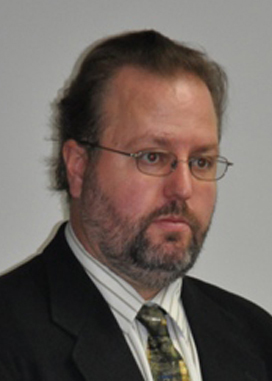Frank Harrell Jr., Ph.D., professor of Biostatistics and founding chair of Vanderbilt’s Department of Biostatistics in 2003, will step down as chair after the completion of a national search for his successor.

Harrell, whose area of expertise includes predictive modeling, statistical computing and Bayesian methods of biostatistics, will focus on developing a new center for health data science, continue leading the study design program in the Vanderbilt Institute for Clinical and Translational Research (VICTR) component of the just-funded NCATS Vanderbilt-Duke Trial Innovation Center, and will be detailed to the FDA Center for Drug Evaluation and Research Office of Biostatistics as Expert Biostatistics Advisor. He will also continue to lead the analytical effort in the National Neurosurgery Quality and Outcomes Database Coordinating Center.
David Penson, M.D., MPH, professor and chair of Urologic Surgery and the Paul V. Hamilton, M.D., and Virginia E. Howd Professor of Urologic Oncology, will lead the search committee to identify Harrell’s successor.
Under Harrell’s leadership, the biostatistics community has flourished at Vanderbilt and the department has grown from seven to 33 faculty and 19 staff Master of Science biostatisticians. Currently, biostatisticians participate in 211 external grants and contracts. In addition, members of the Biostatistics faculty are having great success competing for National Institutes of Health (NIH) and National Science Foundation funding as principal investigators on research grants.
“Dr. Harrell’s numerous contributions have been instrumental to the success of biomedical research at Vanderbilt. Under Frank’s leadership the department was founded and has evolved to become an integral collaborator, with its biostatisticians on the forefront, serving as outstanding partners who provide invaluable insights around a host of questions involving biology, diseases, treatments and patient outcomes,” said Jeff Balser, M.D., Ph.D., President and CEO of VUMC, and dean of Vanderbilt University School of Medicine. “While his responsibilities will be changing, I look forward to Frank’s continued leadership in this new role with VICTR.”
Harrell has led the Biostatistics and Research Design Program within VICTR and established innovative new programs such as the daily biostatistics clinics to support Vanderbilt investigators. These daily clinics, established in 2005, are available to any member of the Vanderbilt or Meharry communities with questions related to the use of biostatistics in study design, measurement or data analysis. Vanderbilt is the only medical center in the nation in which daily clinics are offered by professional biostatisticians.
“It is hard to imagine Vanderbilt University today without its robust Department of Biostatistics and its many faculty and programs which have been and are critical to the wonderful success we have had in our research enterprise over the past decade,” said Robert Dittus, M.D., MPH, Executive Vice President for Public Health and Health Care and director of the Institute for Medicine and Public Health. “Frank’s leadership, insight and careful guiding hand have been pivotal to this success,” he said. “The department’s faculty collaborate with investigators broadly across the Medical Center and across the spectrum of research, from fundamental laboratory discovery to clinical, translational and policy research. I look forward to working closely with Frank as he remains on faculty and in a leadership role in other areas.”
Biostatistics has a long history in the Vanderbilt University School of Medicine. Paul Densen, D.Sc., was the first trained biostatistician appointed to a U.S. medical school when he joined the faculty in 1939. Chuck Federspiel, Ph.D., Professor Emeritus, who remains active within the department, joined the faculty in 1959. Bill Dupont, Ph.D., came from Hopkins in 1977 and was Chief of the Division of Biostatistics in the Department of Preventive Medicine from 1987-2003. Yu Shyr, Ph.D., was recruited from Michigan to direct Cancer Biostatistics in 1994. In 2003, when Harrell joined Vanderbilt as chair of the newly established department, VUMC was at the beginning of an unprecedented growth in its research enterprise. The programs and collaborations that he established greatly contributed to the growth and helped create the analytical infrastructure that has underpinned many successes, Dittus said.
In addition to the department’s contributions to the science of biostatistics itself and as collaborative investigators within the research enterprise, new educational programs have been developed, including both an M.S. and Ph.D. program in biostatistics. In 2008 Harrell recruited Jeffrey Blume, Ph.D., who designed and now directs the graduate programs. The department admitted its first student in 2011 and now has 33 graduate students. Evidence of the success of the program is reflected in the 140 annual applicants to its four Ph.D. first-year positions.
“I feel lucky to have taken on the chair position in 2003,” Harrell said. “I feel that Vanderbilt’s academic achievements, environment and leaders geared the Department of Biostatistics for success and I’m thrilled to have been a driver and a passenger on this ride. I look forward to seeing the second chair of the department taking the department to even greater heights.”
Before coming to Vanderbilt Harrell was professor of Biostatistics at the University of Virginia (UVA).
Prior to his stint at UVA, Harrell, who has a Ph.D. from the University of North Carolina, Chapel Hill, spent more than 17 years in the Duke Clinical Research Institute. There he worked on clinical trials and on the development of the Duke Cardiovascular Disease Databank, one of the largest prospective cohort studies of patients with coronary heart disease. Models were developed in the study for estimating how long patients with cardiovascular disease will live, and how various therapies affect the chances of the patients’ survival.
Harrell began a new division of Biostatistics and Epidemiology at the University of Virginia in 1996. He has also served on the FDA Cardio-Renal Advisory Committee, as an FDA Statistical Consultant in Biometrics since 1992 and was co-editor of the journal Health Services and Outcomes Research Methodology from 1998 to 2005. He is also on the editorial board of the American Heart Journal and Journal of Clinical Epidemiology.
In 2014 Harrell received the W.J. Dixon Award for Excellence in Statistical Consulting, conferred by the American Statistical Association for his exceptional contributions to the science and art of statistical consulting and collaboration, outstanding mentoring of faculty and students and his leadership.















